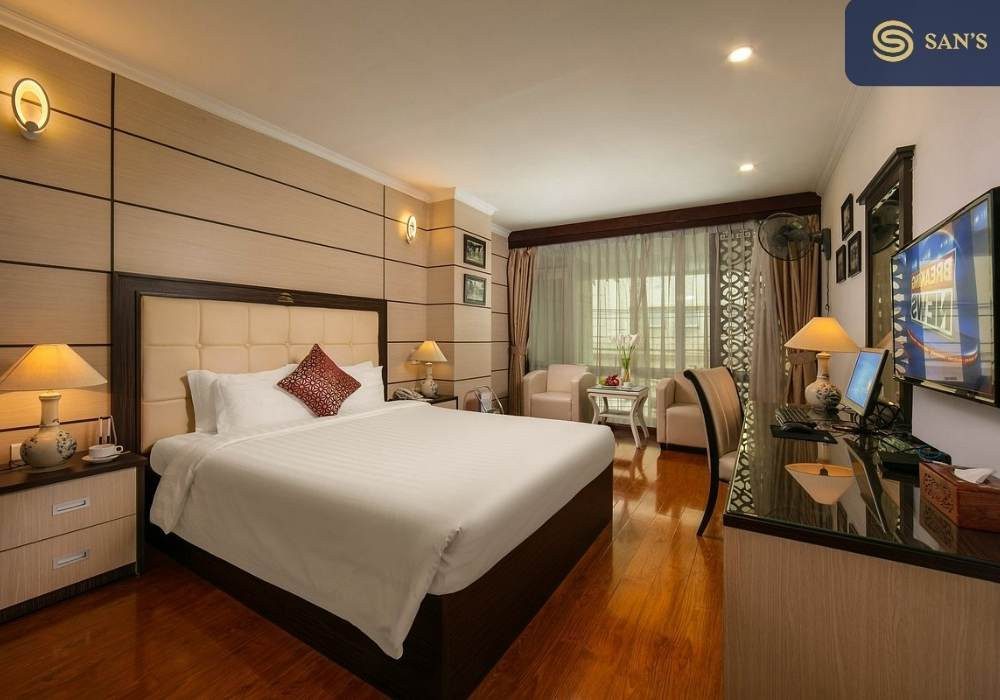Opting for boutique hotels during your travels presents an ideal solution. So what is a boutique hotel? Let’s find out the meaning and requirements. Striking a balance between desiring personal space, disliking dorm accommodations, or adhering to a budget, boutique hotels offer a compelling alternative to lavish 5-star options.
Nestled in the intermediate realm, boutique hotels provide exceptional amenities while remaining within a sensible price bracket. Although no rigid criteria define a “boutique hotel,” they exhibit discernible traits that readily catch the eye.
What is a boutique hotel – Meaning of boutique
A boutique hotel is succinctly defined as a small, sophisticated, and fashionable establishment. Essentially, it signifies a compact, stylish lodging typically situated in a trendy urban locale within a city’s urban district.

While no rigid parameters define boutique hotels, they frequently exhibit shared attributes that bestow them with a unique identity. In contrast to standard accommodations, boutique hotels tend to be more compact, fostering an intimate ambiance while highlighting artistic prowess and design ingenuity.
Their allure emanates from their commitment to exceptional service, aesthetically pleasing spaces, captivating decor, and prime locations. Often nestled in city centers and fashionable neighborhoods, they capture the essence of the city’s culture in their surroundings.
History of boutique hotels
During the 1940s and 1950s, chain hotels underwent rapid expansion, dominating the market by establishing franchises in various cities. Notable names like Marriott, Holiday Inn, and Hilton emerged during this era. While chain hotels thrived, others sought ways to distinguish themselves by offering innovative and unique services, aiming to create a distinctive guest experience.
A notable example is Westin, which pioneered 24-hour room service. Hotels like Ocean Drive on Miami Beach, Beacon Hotel, and Century Hotel followed suit, experimenting with designs, culinary offerings, and service enhancements to set themselves apart from larger hotel chains.

However, this trend faded in the 1960s and 1970s, as cookie-cutter hotels became more prevalent, adopting a uniform style regardless of location. During this period, hotels were often perceived as lacking innovation, focusing solely on conventional services.
The boutique hotel resurgence occurred in the 1980s, primarily in major cities like New York City, San Francisco, and London. The term “boutique hotel,” originally coined by Steve Rubell to describe Morgans Hotel, co-founded with Ian Schrager, revolutionized the industry and ignited a global trend.
This trend has persisted to the present day, with hotel chains even creating sub-brands tailored to boutique hotel enthusiasts. This evolution demonstrates the enduring success of the boutique hotel segment, underscoring its lasting impact on the hospitality industry.
6 Boutique Hotel Requirements
Creating boutique hotels doesn’t adhere to strict requirements, but many establishments follow certain guidelines that align them with this category. While not all are strictly adhered to, these characteristics are commonly observed and prevalent in boutique hotels worldwide:
- Smaller in Size: Boutique hotels tend to be smaller and more intimate compared to larger chain hotels, allowing for personalized experiences and attention to detail.
- Unique in Character: These hotels often possess a distinct personality and style, setting them apart from cookie-cutter chain properties. They may reflect local culture, history, or an individual artistic vision.
- Emphasis on Design: Attention to interior design and aesthetics is a hallmark of boutique hotels. Creative and innovative design elements contribute to the overall ambiance and guest experience.
- Fashionable Location: Boutique hotels are frequently situated in trendy or fashionable areas, providing guests with a sense of local culture and lifestyle. They may be located in city centers or other vibrant districts.
- Personalized Services: Guest-centric service is a priority in boutique hotels. They offer tailored experiences, often going beyond standard offerings to meet individual preferences and needs.
- Diverse Offerings: These hotels provide a range of unique experiences and activities for guests. This can include curated tours, cultural workshops, wellness programs, and more, enhancing the overall stay.
While not every boutique hotel may embody all of these characteristics, they collectively contribute to the distinctive and memorable nature of this hospitality segment.
The Design of Boutique Hotels
While there are no strict rules that a boutique hotel should be stylish and fashionable, this is usually one of their most distinctive characteristics. Their attention to detail and how they give a lot of importance to design comes from the desire of boutique hotels to be unique. As a way to be one-of-a-kind, most boutique hotels employ their knowledge in design and culture to create a distinguished personality for their spaces.

Besides, boutique hotels generally have a contemporary, chic and stylish vibe. They lean towards providing elegance and luxury without going overboard with their prices.
On the other hand, rooms are also individually decorated most of the time and follow artistic and style-forward decor. They also try to have their own character and try to be distinctive and different amongst other hotels in the industry.
The benefits of staying at a boutique hotel

Unique Designs and Decor: Boutique hotels are known for their individualized and captivating designs that reflect the local culture and history. The interior decor often showcases elements that tell a story about the destination’s heritage. This creates a visually appealing and immersive environment for guests.
Personalized Service: With fewer rooms compared to larger hotels, boutique establishments can provide a higher level of personalized service. Guests receive more individual attention, making their stay more comfortable and tailored to their preferences. This creates a sense of being genuinely cared for by the hotel staff.
Attention to Detail: The smaller scale of boutique hotels allows them to focus on the finer details of hospitality. From personalized greetings to thoughtful amenities, guests can expect meticulous attention to detail that enhances their overall experience.
Intimate Atmosphere: Boutique hotels offer a more intimate atmosphere due to their smaller size and design. This fosters a sense of tranquility and relaxation, making them ideal for travelers seeking a peaceful getaway.
Authentic Travel Experience: Many boutique hotels are situated in neighborhoods that are rich in history and culture. This allows guests to explore areas off the beaten path, interact with locals, and gain a deeper understanding of the destination’s authenticity.
Local Immersion: Staying at a boutique hotel often means being immersed in the local surroundings. The hotel’s location in a historic or cultural neighborhood allows guests to engage with the local community, sample traditional cuisine, and explore nearby attractions.
Memorable Ambiance: The distinctive ambiance and character of boutique hotels create lasting memories. Guests often find themselves inspired by the unique design elements, artistic touches, and inviting spaces.
Access to Special Experiences: Many boutique hotels offer exclusive experiences such as guided tours, workshops, and cultural activities. This allows guests to engage with the destination in meaningful ways beyond traditional sightseeing.
Overall, the benefits of staying at a boutique hotel extend beyond mere accommodation, offering a blend of aesthetics, hospitality, and cultural immersion that sets them apart from larger chain hotels.
>>> See more: Hotel in Hanoi Old Quarter Vietnam





